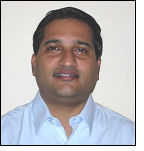- By Research Area
- By University
Directory
Faculty
Directory Details
[Return to Previous Listing]
Ashvini Chauhan
Assistant Professor, Environmental Sciences Institute, Florida Agricultural and Mechanical University
Phone: (850) 412-511
Fax: (850) 599-8183
151 S Martin Luther King Jr. Blvd
305-D FSH Science Research Center
Tallahassee, Florida 32307
https://www.famu.edu/index.cfm?environmentalscience&AshviniChauhan
Education:
Ph.D., Environmental Biotechnology, Institute of Microbial Technology, Chandigarh, India, 2000
Research Interests:
Research in my laboratory is focused on gaining a better understanding of the structure and function of environmental microbiota in both, terrestrial and aquatic ecosystems. With the development and successful applications of 16S ribosomal gene based molecular techniques, direct correlations between the structure and function of microbial communities can be obtained and utilized to gauge ecosystem health and processes. My laboratory utilizes a polyphasic approach by using traditional culture based tools such as most probable number estimates (MPNs) and community level physiological profiling (CLPP) coupled with molecular tools based on the SSU rDNA analyses such as molecular cloning, restriction fragment length polymorphism (RFLP), and denaturing gradient gel electrophoresis (DGGE). We are also using stable isotope probing (SIP) to link the structure to the function of carbon/nitrogen cycling bacterial guilds in different ecosystems. These approaches have previously provided critical cues on effects of eutrophication on Florida Everglades and Blue Cypress Marsh carbon cycling pathways. We are now using similar approaches to examine perturbations caused to soil productivity in bauxite mined soils in Jamaica and measure the efficacy of restoration activities in a project funded by JAMALCO Inc., a subsidiary of Aluminum Company of America (https://www.alcoa.com/global/en/home.asp). Comparisons obtained between unmined and chronosequentially restored mined sites provide conclusive evidence that mining operations result in severe perturbations to the soils such that impacted soils remain significantly low in productivity most likely due to permanent removal/inhibition of critical soil microbiota such as Proteobacteria, Bacteroidetes group, high G+C Gram-positives etc. All these groups are known to rapidly remineralize soil organic matter resulting in increased soil productivity.














